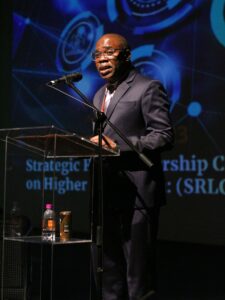UJ’s Strategic Risk Leadership Conference Addresses 4IR Challenges in Higher Education
The management of risk, particularly in the context of the 4IR and South African challenges, is a multifaceted endeavour that demands collective effort, innovation, and a commitment to societal impact.
With this statement, the University of Johannesburg’s (UJ) Vice-Chancellor and Principal Professor Letlhokwa Mpedi officially opened the 2023 Strategic Risk Leadership Conversation on Higher Education (SRLC-HE).

The event, which took place at the UJ Art Centre on Tuesday, 21 November 2023, brought together experts and leaders of different industries with the aim of deliberating on the most recent advancements and optimal approaches in the field of risk management.
Under the theme “Embracing Technology and Managing Risks in the Evolving World Amid Current Challenges in South Africa”, the conference provided a forum for professionals to share their risk management experiences, insights, and latest developments including discussions around the ongoing national power crisis, ageing infrastructure, financial sustainability, cybersecurity threats, artificial intelligence and climate change.
“As we navigate the complexities of this evolving world, we must strike a careful balance between the opportunities presented by technology and responsibly managing the risks they entail. The outcomes of our deliberations today have the potential to echo far beyond these walls and influence policies, shape industries, and impact the lives of millions,” said Prof Mpedi.
He added that the dynamic interplay between technology, risk, and societal impact was at the heart of UJ’s mission.
“Tasked today with deliberating on the most recent advancements and optimal approaches in the field of risk management in relation to higher education, this is certainly the framework that should guide us. This is not merely a topic of academic debate but rather, it is a clarion call for action in a time marked by unparalleled shifts in our economic, social, and technological landscapes. The outcomes of our deliberations today have the potential to echo far beyond these walls and influence policies, shape industries, and impact the lives of millions.

Panel discussions included insights from industry leaders including Dr Phethiwe Matutu, Universities South Africa CEO, who spoke about the risks facing higher education locally and globally. She reflected on issues of funding and governance within institutions.
“Globally, when it comes to higher education, we are all talking about the same things.”
She added that issues of sustainability, funding and the lack of access needed to be addressed through better policies.
“We need to look at potential solutions and the governing elements of mobilising the resources available.”
The keynote address was given by Prof Ahmed Bawa, Professor Of Human-Machine Interface at JBS, who focused on higher education in context of the past, present and future. He touched on the prevalence of unemployment, inequality, poverty, global warming, the erosion of democracy, the degradation of ethical society, political violence, changes in the world of work, public health challenges and global migrations which are key factors affecting universities today.
Topics for the panel discussions included ‘Prospects of artificial intelligence in academia and its legal implications’ as well as ‘The challenges in Higher Education with the current funding model’.
Speakers for the day included UJ’s Prof Michele van Eck; Head of Department: Private Law, Professor Tankiso Moloi; JBS Director: Academic, Dr Alistair Mokoena; Google South Africa as well as Alwie Lester; Special Advisor to the Western Cape Premier.

